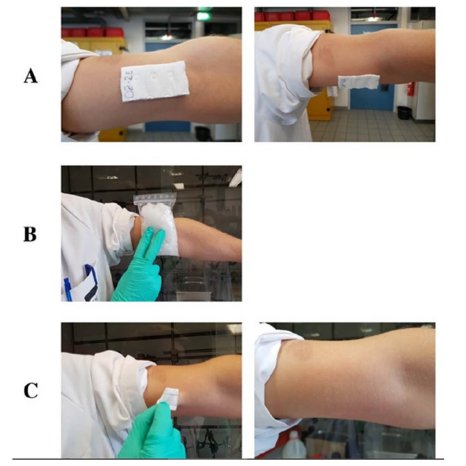Currently, the majority of self-adhesive wound dressings rely on a zinc oxide rubber adhesive system developed over 100 years ago. The removal of these dressings can be very painful and may damage regenerated tissue. Therefore, for over 30 years, research has focused on alternative adhesive materials based on the "bond/debond-on-demand" principle. This is because no suitable solutions currently exist for individuals with allergies, burn wounds, or chronic wounds, such as those in diabetic patients.
In a project funded by the Baden-Wuerttemberg Foundation, researchers at the University of Freiburg have developed an innovative polymer for wound dressings that adheres securely under temperature control but is easy to remove. This approach enables dressings to adhere firmly to the skin or wound site at body temperature without restricting the patient's freedom of movement. However, when the dressing is cooled, such as with a cold pack, it can be removed very easily and without pain. Additionally, no adhesive residue remains on the healing tissue. The adhesive material's property of "switchable stickiness" is achieved through a crystallization process.
The research team at the Institute of Macromolecular Chemistry at the University of Freiburg, led by Prof. Dr. Rolf Mülhaupt and Prof. Dr. Thorsten Steinberg, who supervised the project from a medical perspective at the Freiburg University Medical Centre, developed an adhesive consisting of copolymers and polyvinyl alcohol (PVA) fatty acid esters with crystallizable side chains and varying compositions. The strategy is based on thermoresponsive polymers, which are solid at room temperature and molten at body temperature, exhibiting adhesion only in the molten state. Cooling induces crystallization of these side chains, resulting in a loss of adhesion to the skin. Crystallization causes physical cross-linking of the material, significantly inhibiting adhesion to the skin while increasing the material's cohesion. This allows the dressing to be removed in one piece without leaving any adhesive residue and without causing pain. Simultaneously, the volume is reduced, decreasing the contact surface between the wound dressing and the skin, facilitating detachment.
In application, the material changes due to body heat and adheres accordingly. By applying a cold pack, the material crystallizes and no longer adheres to the skin. The material does not enter the wound. This wound dressing is particularly suitable for burns, allergic or sensitive skin, or infected wounds, as it prevents skin injuries or detachment. This type of wound dressing is also ideal for inpatient wound treatment or for large wounds, as it leaves no adhesive residue and exhibits excellent biocompatibility.
A patent application has been submitted for this invention (WO2023/ 134899A1). The Technologie-Lizenz-Büro (TLB) GmbH supports the scientists at the University of Freiburg and the Baden-Wuerttemberg Foundation in patenting and marketing the current development. TLB has been commissioned to commercialize this pioneering technology and offers manufacturers of wound care materials the options of licensing, purchasing the patent, or collaborating on further development.
For additional information, please contact: Innovation Manager Dr. Frank Schlotter (schlotter@tlb.de)

